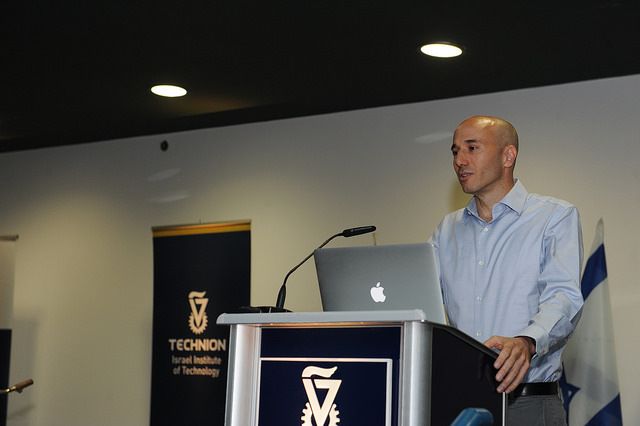Adelis Prize
The 2018 Adelis Prize for Brain Research was awarded at Technion to Dr. Ofer Yizhar from the Weizmann Institute of Science
The 2018 Adelis Prize for Brain Research was awarded at Technion to Dr. Ofer Yizhar from the Weizmann Institute of Science. The main criteria for winning the Adelis Prize are excellence, innovation and proven scientific achievements. The Adelis Foundation’s management noted that the level of candidates submitted this year was outstanding and is a clear indicator of the vast potential of brain research in Israel.
The Adelis Foundation was established by the late Mr. André Cohen Deloro in order to support academic excellence in Israel, especially in the fields of scientific and medical research. In 2015, the Foundation inaugurated the Adelis Prize for Brain Research, now in its fourth year, in keeping with the intellectual legacy of its founder and out of loyalty to his vision. Each year, the Foundation confers a $100,000 research grant to a young, trailblazing Israeli researcher in the field of brain research. The prize is meant to encourage excellence among young Israeli scientists who are studying the brain, advance knowledge about the brain’s functioning and illnesses connected to the brain, and translate this knowledge into international impact.
This year, the jury included Dr. Gal Ifergan, Prof. Moshe Bar, Prof. Illana Gozes, Prof. Eilon Vaadia, Prof. Jackie Schiller, Prof. Noam Ziv, Prof. Rafi Malach and Prof. Michal Schwartz – all leading researchers in the field in Israel.
Dr. Yizhar received the award from the President of the Adelis Foundation, Mr. Albert Deloro (Mr. André Cohen Deloro’s brother), Technion President Prof. Peretz Lavie and trustees of the Adelis Foundation. The ceremony took place on June 11th during Technion Board of Governors meeting.
Prof. Jackie Schiller from Technion’s Rappaport Faculty of Medicine explained the jury’s decision: “Dr. Ofer Yizhar is a talented young scientist who has become one of the leading brain researchers in Israel. Dr. Yizhar develops innovative optogenetic methods for researching and learning about one of the most fascinating questions in brain studies: what are the mechanisms in the brain that are responsible for emotional and cognitive effects of social abnormalities? This study aims at understanding the parts of the brain responsible for controlling social behavior that, when damaged, might trigger psychiatric disorders. Dr. Yizhar has already positioned himself as a brilliant scientist on a global level, with several significant contributions to the field of optogenetics and the study of social behavior abnormalities in autism.”
Dr. Ofer Yizhar
Dr. Ofer Yizhar is a senior researcher in the Department of Neurobiology of the Weizmann Institute of Science. He received a BSc with honors in Biology from The Hebrew University and a PhD with honors in Neurobiology from Tel Aviv University. He completed his postdoc at Stanford University in the U.S., after which he joined the Weizmann Institute of Science in 2011 as a senior researcher.
The research in Dr. Yizhar’s lab deals with the mechanisms by which the prefrontal cortex controls behavior, emotional regulation and social communication. In order to conduct in-depth research on the prefrontal cortex’s complex nerve circuits, Dr. Yizhar is developing and implementing a method known as optogenetics.Optogenetics lets scientists understand the contribution of neurons to brain processes and decipher the complex connectivity network the brain uses for neuronal computation. Dr. Yizhar’s group uses these methods to understanding the organization of functional synaptic connectivity in the prefrontal cortex of mice. Genetic modifications related to psychiatric disorders such as schizophrenia and autism, as well as social isolation and extended stress, trigger changes in this network’s connectivity. Dr. Yizhar’s research focuses on characterizing these changes in order to better understand the mechanisms of the prefrontal cortex and the changes that occur in cases of psychiatric disorders.



